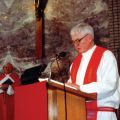Sisters of Service, St. Joe’s Sisters sign sponsorship deal
By Vanessa Santilli-Raimondo, The Catholic RegisterTORONTO - At their peak in the 1960s, the Sisters of Service had 125 members. But with their numbers down to 20, the congregation decided it was time to plan for their future. For help, they turned to the Sisters of St. Joseph of Toronto.
On Jan. 25, the Sisters of Service and the Sisters of St. Joseph of Toronto signed a sponsorship agreement wherein the Sisters of St. Joseph will now be responsible for the management and governance of the congregation of the Sisters of Service as long as a Sister of Service lives.
CYO camp gets permanent home
By Vanessa Santilli-Raimondo, The Catholic RegisterAfter years without a permanent location, the diocese of Hamilton Catholic Youth Organization’s Camp Marydale will once again have a home this summer.
A barrier-free park that’s been in the works since 2003, Marydale Park in Mount Hope, Ont., will serve the campers in the summer and be open and accessible year-round.
“When we decided to build it, we decided we weren’t going to just build a park,” said day camp director Karen Hartnett. “We were going to make sure it was accessible to everyone. In 1972, we were one of the first camps in Ontario to fully integrate children with special needs into our programs… so we decided, let’s break down another barrier.”
Abortion protest aims to keep issue in people’s minds
By Ramon Gonzalez, Canadian Catholic NewsEDMONTON - Carrying placards against abortion, about 20 people marched in front of Edmonton’s Law Courts Building Jan. 27 to mark the 24th anniversary of the Supreme Court decision that threw out Canada’s abortion law.
“Twenty-four years ago, every (abortion) restriction in Canada was struck down by the Supreme Court,” lamented Edmonton Prolife spokesperson Karen Richert. “Abortion in Canada is wide open and is also paid for with your tax dollars.”
Celebrating — proudly — Black History Month
By Michael Swan, The Catholic RegisterTORONTO - Black History Month this year is an opportunity for Catholic parishes and schools in Canada to discover Our Lady of Kibeho's message of prayer, conversion and reconciliation, said Jesuit Father William Mbugua at a Black History Month Mass at downtown Toronto's Our Lady of Lourdes parish Feb. 5.
"We have something good to share," said Mbugua. "We are not just victims of our history. We have to ask, what is it that God has given us, even in the midst of suffering?"
In 1981 Our Lady of Kibeho began to appear to high school girls in Rwanda. In his homily, Mbugua urged about 300 gathered for the Sunday evening Mass to share the story of the Vatican-endorsed apparitions in rural Rwanda 30 years ago.
Pope names two bishops to Quebec dioceses
By Deborah Gyapong, Canadian Catholic NewsOTTAWA - On Feb. 2, Pope Benedict XVI named new bishops to the Quebec dioceses of Trois-Rivières and Mont-Laurier upon accepting the resignation of their Ordinaries who had reached the retirement age of 75.
Bishop Luc Bouchard, who has been serving the bilingual northern Alberta diocese of St. Paul since 2001, has been named to Trois-Rivières, replacing Bishop Martin Veillette, while Bishop Paul Lortie, an auxiliary bishop in the Quebec archdiocese since 2009, will become bishop of Mont-Laurier, a diocese in southwestern Quebec, north of Gatineau, replacing Bishop Vital Massé.
UN to hear of 'shameful' conditions for native children
By Michael Swan, The Catholic RegisterTORONTO - A half-dozen aboriginal youth headed for Geneva have shameful things to say about Canada and how it treats First Nations children. But their testimony before the United Nations Committee on the Rights of the Child will be given in the hope that Canada can do better, the young delegates told media in Toronto Feb. 2.
"There's been talk for years and years and years. If there's just going to be more talk, I wouldn't consider that a success," said 24-year-old John-Paul Chalykoff from the Michipicoten First Nation on the north shore of Lake Superior.
As is, Bill 13 is ripe for lengthy legal challenge
By Deborah Gyapong, Canadian Catholic NewsOTTAWA - The Evangelical Fellowship of Canada has warned Ontario legislators that passage of anti-bullying Bill 13 as is could result in years of tax-funded litigation.
“Before overriding the choices parents make in education, legislators are cautioned that this is not a right to be overridden casually,” write EFC legal counsel Faye Sonier and Don Hutchinson in an open letter sent to Ontario MPPs Jan. 25. “There is an obvious constitutional violation in forcing religiously based schools to establish clubs not endorsed by the faith community, parents or students, or to implement curriculum that disrespects their beliefs.”
Spiritans lose a ‘brilliant person’ in Fr. Graham
By Vanessa Santilli-Raimondo, The Catholic RegisterTORONTO - Spiritan Father Edward Graham, who taught for many years in Spiritan schools, passed away Jan. 26 at the age of 88. He was in his 62nd year of the priesthood with the Spiritans.
“He was a brilliant person,” said Fr. Paul McAuley, a fellow Spiritan who had known him for about 30 years. “He was very kind and lived very simply.”
Politicians can't just shed their faith
By Luc Rinaldi, The Catholic RegisterTORONTO - The separation of church and state is a concept engrained in the identity and culture of Western democracy as a means of protecting religion, not eliminating it, according to the Very Rev. Lois Wilson.
But that definition has become less and less believable, Wilson told a few dozen young adults gathered in downtown Toronto at a Theology on Tap event that questioned what role religion should play in forming the public policy of a secular state.
Lapsed Catholics invited to take another look
By Pat Byrne Casey, Canadian Catholic NewsMAPLE RIDGE, B.C. - St. Luke’s parish in Maple Ridge recently invited 8,200 people, give or take a few thousand, to dinner.
That number, says a media release from their office, represents the one-fifth of the local population who are lapsed Catholics.
“Those of us who live our faith take great comfort in it,” said Vernon Robertson, a parishioner and the organizer of the event, a “full meal deal” entitled Discovering Christ.
Crown, First Nations’ covenants must be retained
By Deborah Gyapong, Canadian Catholic NewsOTTAWA - The historic Crown-First Nations Gathering revealed stark differences on how the relationship between Canada’s founding peoples and the government, embodied in the Indian Act, should continue.
And whatever is resolved, an advisor to the Catholic Church said, must re-affirm historic treaties signed between the two.
It is about recognizing the sacred importance of covenants, said Gerry Kelly at the one-day gathering held in Ottawa Jan. 24. Kelly is the former director of the Canadian Conference of Catholic Bishops’ secretariat on aboriginal affairs and now advises Catholic entities regarding the Indian Residential Schools legacy.
“Our whole understanding of our relationship with God is understood scripturally in terms of covenants,” said Kelly. “We understand what it means. A covenant is sacred. We can’t hold that position and not recognize the covenant relationship established by treaties. It is timeless and it is binding.”
Assembly of First Nations National Chief Shawn Atleo called the Indian Act “a breach” of the government’s commitment to First Nations peoples that was “built on a disgraceful premise of our inferiority.”
“It is well past time that we began to undo the damage that Act has inflicted on our peoples, and to our partnership,” Atleo said, noting it formed the basis for the reserve system, residential schools and prohibitions of spiritual and cultural practices.
Prime Minister Stephen Harper, however, promised an incremental approach to remedying some problems inherent in the Act, but bluntly stated his government had “no grand scheme to repeal or to unilaterally re-write the Indian Act.”
“After 136 years, that tree has deep roots. Blowing up the stump would just leave a big hole,” Harper told the more than 150 First Nations leaders at the gathering. “However, there are ways, creative ways, collaborative ways, ways that involve consultation between our government, the provinces and First Nations leadership and communities, ways that provide options within the Act, or outside of it, for practical, incremental and real change.”
The gathering was called to find ways to improve the relationship between Canada’s First Nations’ people and the federal government. It had been planned for some time, with the date finalized during the period in late 2011 when images of the poverty on Canada’s reserves were brought to the forefront with the poor housing conditions that plagued Attawapiskat in Northern Ontario.
Kelly said incremental approaches are not problematic in themselves.
“So much of this depends on good intentions and fairness,” he said. The challenge in the past has been with First Nations and bands being pressured “to give up their full rights for a limited parcel of rights.”
The other problems with an incremental approach are strictly practical, he said.
“The longer this process takes, the more resources are taken from First Nations lands in the context where their rights to resources and benefiting from those resources are ignored.”
Aboriginal entrepreneur and consultant David Acco, a Catholic and Montreal-based member of the Cree First Nation, said the gathering could not have taken place in the 1960s or ’70s with the kind of aboriginal inclusiveness of today. Aboriginal people have developed the leadership abilities and legal skills to put them in a better position to negotiate, he said.
Acco, president of Acosys Consulting, said a long-term vision is needed that takes into consideration how current negotiations will affect future generations.
“I don’t think aboriginal people are going to get another opportunity to right the wrongs of the past like we have now in another 100 years,” Acco said.
He also raised concerns about incremental approaches creating a hierarchy of “haves” and “have-nots” that will see some First Nations rewarded and others, like Attawapiskat, left behind. Communities like Attawapiskat need the Indian Act for their survival, Acco said, because of the fiduciary responsibility the Crown has to First Nations. An incremental approach decentralizes and potentially fragments any unity among First Nations, he said.
The gathering’s “outcome statement” affirmed principles in the Joint Action Plan the government and First Nations developed in June 2011 that included improving relationships and partnerships “respectful of aboriginal and treaty rights,” transparent and accountable governance, empowering success through education and opportunity, promoting self-sufficient communities and assisting economic development that will benefit all Canadians.
The statement called for immediate action on a renewed relationship that includes multi-year funding, improved financial accountability on the part of all with the goal of First Nations financial self-sufficiency. It affirmed an incremental approach to “removing barriers to First Nations governance,” by working around and through existing mechanisms in the Indian Act, which cannot be replaced overnight,”and committed both parties to “respect and honour our treaty relationship and advance approaches to find common ground on treaty implementation.”












